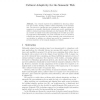604 search results - page 64 / 121 » Representing Information Need with Semantic Relations |
80
Voted
SEMWEB
2007
Springer
15 years 5 months ago
2007
Springer
Our research explores the possibilities for factoring culture into user models, working towards cultural adaptivity in the semantic web. The aim is to represent the user’s positi...
AIMS
2007
Springer
15 years 5 months ago
2007
Springer
Policy conflict analysis processes based solely on the examination of policy language constructs can not readily discern the semantics associated with the managed system for which ...
SEMWEB
2007
Springer
15 years 5 months ago
2007
Springer
Classical ontologies are not suitable to represent imprecise nor uncertain pieces of information. Fuzzy Description Logics were born to represent the former type of knowledge, but ...
103
click to vote
LREC
2010
15 years 10 days ago
2010
With the proliferation of applications sharing information represented in multiple ontologies, the development of automatic methods for robust and accurate ontology matching will ...
112
Voted
CONCUR
1999
Springer
15 years 3 months ago
1999
Springer
Abstract. The paper presents a partial order reduction method applicable to networks of timed automata. The advantage of the method is that it reduces both the number of explored c...

